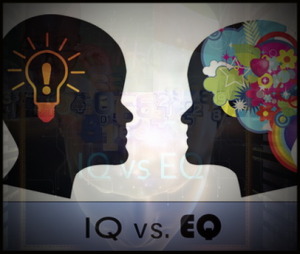Difference between Emotional Quotient (EQ) and Intelligence Quotient (IQ)

In this modern era, people in business are looking forward to hiring intellectuals to gain advantages. It refers to a person having a good IQ, but somewhere a person having control over emotions is demanded. Although, it is not a general topic to ponder over but a need to know. This post will reveal the difference between Emotional Quotient (EQ) and Intelligence Quotient (IQ).
What is Emotional Quotient (EQ)?
EQ stands for Emotional Quotient or Emotional Intelligence. It is the ability to control one’s emotions, including groups, an individual, and a closed one.
What is Intelligence Quotient (IQ)?
IQ stands for Intelligence Quotient. It is a standardized test and an assessment of intelligence that is acquired from any institution.
Emotional Quotient (EQ) Vs Intelligence Quotient (IQ)
-
Origin:
It was developed in 1985 by Wayne Payne’s in his Doctoral Study named “A Study of Emotions: Developing Emotional Intelligence.” This term was first used in Daniel Goldman’s book “Emotional Intelligence.” On the other hand, Intelligence Quotient was developed before 1883 to evaluate school children’s intelligence in France.
-
Significant Abilities:
The person with an emotional quotient can understand others’ and his own feelings. Adding more, the person evaluates and controls emotions in order to make meaning. On the other hand, the person with high IQ is able to apply learned information on reasoning, Maths, and additional relevant information.
-
Variance in the Workplace:
People with high EQ acquire prospective leadership, teamwork, and prosperous relations, whereas high IQ beings are good challengers and possess the ability to deal with any kind of information and task.
-
Measurement and Testing:
EQ is a subjective type of test that includes few tests like:
-
- Mayer-Salovey-Caruso Emotion Intelligence Test: It evaluates the person’s aptitude for reasoning with Emotional Information. This type of test consists of four branches of emotional intelligence (EQ) test, which are understanding emotions, managing emotions, facilitating thoughts, and perceiving emotions.
- Goleman’s model: It includes two tests; one is the Emotional Competency Inventory, and the other is emotional intelligence appraisal.
On the other hand, IQ is an objective type of test, which includes the following tests to assess cognitive abilities.
- Stanford-Benet Test: It is a form of examining a person’s (especially children) intellectual ability based on five factors including, knowledge, fluid reasoning, quantitative reasoning, working memory, and visual-spatial processing. This test can also measure verbal and non-verbal responses.
- Wechsler Intelligence Test: This test targets measuring the cognitive abilities of adults and older adolescents. This test is designed by having the idea that intelligence is not based on a single general intelligence test; instead, it is made up of multiple mental abilities.
- Woodcock-Johnson Test: It is among the popular tests- consists of series- used to measure the overall cognitive abilities, including the capability of academic achievements, scholastic aptitude, or oral language.
What’s more important, IQ, or EQ?
Both are vital at their stance. IQ is closely allied with one’s mind, and mind nourishment happens in schooling, whereas EQ is linked with a person’s own life or may be inherited. Past research statistics say that 14% of job performances are based on IQ, but less than 1% are found in EQ. But the latest research proves that people with more emotional intelligence (EQ) are preferred in business dealings and marketing (like an insurance company) because they have more stamina and patience, also can control feelings like anger, frustration.
Can IQ and EQ be learned?
Some people have inborn EQ, while others can also attain it by motivation, learning to keep calm, balancing emotions, and practicing in the workplace.
IQ has less to do with learning because it is inborn characteristics and can be a genetic gift for a child. In different stages of life, a person’s IQ level varies and changes, may be from maturity or experience.
Summing up, after revealing the crux, the EQ comes under irrationality, and the IQ comes under rationality. Some people articulate that EQ is overrated as it has no scope in the business and academic arena, but it is not. On and off both have their applicability in the fields. The people having high EQ can empathize and understand the emotions of themselves and others. They can perform some tasks (leadership, teamwork) better than people having high IQ because they develop an instant connection with others. IQ can be increased through various tests and training. The people with high IQ often show achievements in academics and mental activities (logical reasoning, algorithms, math skills, word comprehension). They got more chances to enroll in jobs because they have high scores in academics. We can’t say that IQ is superior over EQ or vice-versa. Both have to be attained by a person to get success, happiness, and mental peace.What is your opinion?


Leave a Reply